
2019 June 13th, Kingston University & St Georges University London, St George’s campus. Micahel Heron Lecture Theatre
SKELLERN LECTURE, Professor Mick Mckeown - Making the most of militant and maverick tendencies for mental health nursing
Introduced by Ben Hannigan
“Good evening, with the 2018 Skellern lecturer, Geoff Brennan, unable to be here it falls to me to introduce Mick McKeown who stands, frankly, as one of the mental health and nursing fields’ most distinctive, critically-minded, and values-informed voices. Mick’s job title, Professor of Democratic Mental Health, gives us a big clue as to what he believes to be important (along with football and beer: more about those in a moment).
Here are some words from Geoff, in his absence, which I am very pleased to read out on his behalf: Len Bowers once described Mick McKeown as ‘the beating heart of psychiatric nursing’. And I agree. Mick is a mixture of passion and intellect, grit and gold - the virtual love child of Liam (the knife) Clark and Phil (the beard) Barker. I’ve known Mick since his Thorn days and amazing work with carers in Ashworth. I remember his advocacy for the families who suffered the double trauma of their loved one being in a secure unit and their loved one having committed terrible deeds. His description of their struggle has stayed with me since, so deep was his understanding and empathy. But that’s Mick. I’m not going to go on about all the other stuff – the truth and reconciliation ideas, the work with service users, his fantastically honest articles in Asylum Magazine or his championing of critical discourse in how we do this funny business we find ourselves in. He can and will do that without my help. I’m only going to say how deserving of this honour he is, and how sorry I am not to be there. And here’s a flavour of Mick’s accomplishments, all of which he wears remarkably lightly. His co-authored article, with Helen Spandler (which Geoff mentioned without mentioning), ‘Exploring the case for truth and reconciliation in mental health services’ and published in the Mental Health Review Journal, was selected in July 2018 as an Outstanding Paper in the Emerald Literati Awards. With Karen Wright, Mick co-edited last year’s Essentials of Mental Health Nursing, which, unusually for a text aimed primarily at undergraduate students of mental health nursing is as strong on the larger context for care and on ideas being open to contest as it is on the skills associated with everyday practice. At UCLan in Preston, where Mick works, he helped set up the Comensus network which involves service users, carers and the wider community in scholarly activities across the University. Here are some words from Mick’s peers at UCLan. First, from Helen Spandler: Mick is a great colleague, always ready and willing to go out of his way to help colleagues and always defends the underdogs. He takes a ‘can do’ and positive approach to mental health reforms whilst still being critical of mental health policy and practice – but in a constructive way to try and create social change. He’s one of few senior academics who (when not on the football terraces) keeps his feet firmly on the ground and spends as much of his time with Unison colleagues, workers and service users as with other academics – supporting grassroots initiatives for progressive social change. And from Karen Wright: Mick is a fabulously collaborative academic, never taking glory for himself and always ensuring that everybody's contribution is recognised. He loves a good walk, and likes to explore new places, searching out historical and novel features of places that he visits. Sadly, his sense of direction doesn’t always match his sense of adventure and 30 min sight-seeing strolls turn into magical mystery tours into the night! Fortunately, there never seems to be any shortage of 'watering holes' along the way. e.g. when at a conference in Niagara Falls, Mick reportedly once said ‘there's a bike hire place down the road...how do you fancy renting a bike and cycling over to Niagara on the Lake, it’s supposed to be nice?’ The bike hire place must have evaporated, and 21 miles later (on foot), with one member of the party with plantar fasciitis and me [Karen] in flip flops we end up where we were wanting to be. Needless to say, liquid refreshment was required. Karen adds: Don’t be misled by the veneer of ‘tough, campaigning scouser’. He is a soft hearted, kindly soul...from providing trays full of cat food to the PDSA to choosing an asthma inhaler over separation from the family's beloved long-haired puss. And here’s my own contribution before I sit down. I mean it when I say that Mick is one of our field’s most important and original critical thinkers and doers. I too know him to be unfailingly generous with his time and unstintingly supportive. I also know him to be passionate about social justice and genuine partnership, the very model of the activist academic possessed of a vast hinterland traversing politics, philosophy, sociology, psychology, history and the health and care sciences. When Mick writes, we need to read, and when he talks we should listen. Please join me in giving the warmest of welcomes to this year’s Skellern Lecturer, Professor Mick McKeown”..
Lecture Synopsis: Mental health nursing faces a crisis of legitimacy necessitating critically inspired remedies. I draw upon critical social theory, my own work, activism and anecdotes to suggest alternative futures. In a spirit of persuasion, provocation and poignancy I present workplace democracy, inclusive of workers and service users, as a utopian, yet realisable, means of organising services, capitalising on relational nursing skills; congruent with democratic and dialogic therapy, education and research and aspects of new left populism.
Mental health nurses are susceptible to a deception we always occupy a virtuous occupational role, blinding us to important socio-political actualities. Not least of these is our complicity within an alienating psy-complex of biomedicine and social control operating under an overarching neoliberal polity and risk society. Democratic aspirations complement a call for a new politics of mental health, or a revisiting of some old politics. A case is made for critically engaged academics, practitioners and their trade unions, in alliance with community, service user and survivor activists, to take these ideas forward in practice, education, research and popular protest. Though defending the Welfare State from neoliberal assaults is a priority, it is, on its own, insufficient. We need to build solidarity relations between mental health stakeholders that can get beyond the hurt and harms of psychiatry as we know it. To these ends, a grass-roots process of truth and reconciliation is advocated.
The radical scholar of mental health care, Peter Sedgwick, was happy to adopt the militant, ‘maverick’ identity of his hero, the revolutionary Victor Serge. He offered the persuasive claim that the activist goal of transforming society neatly encompasses the relational transformation required of psychiatry. I contend that we need more mavericks in our ranks and we can imagine and work for a better future.
JPMHN LIFETIME ACHIEVEMENT AWARD, Patrick Callgahan
Introduced by Professor Sally Hardy
“Here is a message from Phil Burnard, 2018 Lifetime Achievement Recipient: ‘I wish I was with you, Patrick, to help celebrate you being given - most appropriately - your Lifetime Achievement Award. I would love to have been the one who introduced you to the most important of audiences; one that is made up of other mental health specialists. You are among great friends! I am not exaggerating to say that this time last year was one of the best days of my life. I am sure it will be for you, too. Yours is being a stella career. The fact that you are Dean of Applied Sciences and Professor of Mental Health Science demonstrates the breadth of your abilities and your work.
I know you have interests is a great number of fields but what really impressed me is your interest and research into evaluating a range of psychosocial interventions in mental health care and your testing of social cognition models in a variety of applications. This work needs to be done and you are doing it! Mental health care, education and research have come a long way in the past few years. It is so good to see that studies like yours are being undertaken. It is relatively easy to apply various methods to the education of nurses and the treatment of mental health care patients. It is less easy to evaluate these methods and really sort out what helps and what helps best. I am really glad you are doing this and I know that patients and health care professionals will really benefit from the outcomes of your work. Your publication list is stunning and goes to further understand the intricacy and diversity of your work. I particularly like the fact that your research spans both quantitative and qualitative methods. I have often thought that to call yourself a researcher, you should be able to move between the two. You have raised over six million pounds in research funding. That is SIX MILLION POUNDS! Not only is that bankable for your research projects, I am sure it makes YOU very bankable for your university! I know just how hard it is to raise research funding and also how hard it is to work in university settings at the moment. Your work with committees and organisations must eat into your valuable time and I am so glad that you are doing it. You not only teach and research but you pass on your knowledge to others - both here and in other countries. It is difficult to highlight a particular study of yours but I note that you led the evaluation of the Chief Nursing Officer's Review of Mental Health Nursing in England between 2007 and 2010. Since then you have gone on to a huge number of projects alongside some excellent co-researchers. Again, I am really impressed by the way in which your expertise covers so many fields. I would like to say thank you, on behalf of both patients and practitioners. You are a polymath in the world of mental health care. Patrick, you deserve this award more than anyone else I can think of. Enjoy your evening and keep up the good work, as I know you will! Very, very best wishes, Phil’. And from Alan Simpson: ‘At City University London, his big achievements including appointing our first Service User Lecturer, Ian Light. This was way back in 2005/6 so ahead of the pack, and I worked very closely with Ian until his far too early death. Second, when Head of the mental health nursing department, he cut our team meetings from 3 hours to 1 hour. Fabulous. Yet, bizarrely, his name still appeared against all items on the agenda. On a personal note, Patrick has been a consistent and generous friend to very many people and is always the one who will take people out for a posh tea and cakes to recognise their achievements or when they are going through tough times. He has an eye for stylish décor and design – but sometimes the trendy makers of plastic kitchen chairs see him coming’. And from Ben Hannigan: ‘I remember Patrick as Mental Health Nurse Academics UK’s first elected chair, and the fantastic work he did to get the group off the ground in its earliest years. You could mention, too, his rock-solid support for both me and others working in universities across the country to develop their careers, and the opportunities he gave me and others to contribute chapters to books he led and edited”. And from Gary Winship; “In my experience of Patrick’s various leadership roles at Nottingham, in the IMH, in the Trust and in the University School of Health sciences, he cut a formidable figure, albeit svelte, with a ferocious appetite for task. His presence, drive and reputation around the place was such that you would know he was in room even before he’d actually arrived there.” Patrick, it is a privilege to know you, work with you and be introducing you for this award this evening. As Phil eloquently put it, you are amongst people here who admire you and aspire to be like you. If Eileen Skellern were here, I am sure she too would be proud of your lifetime achievements”.



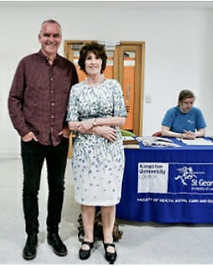
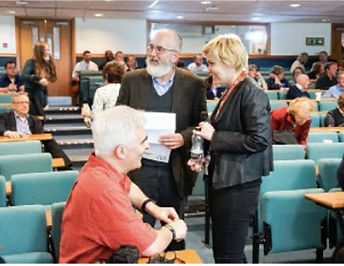


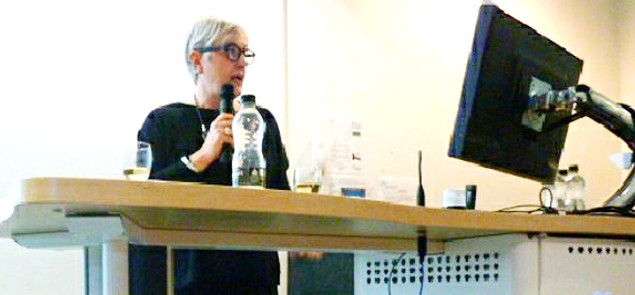


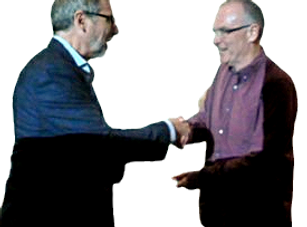
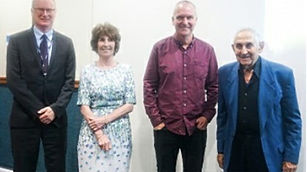
SCHEDULE
6.00pm Evening Chair: Professor Mary Chambers
6.05pm Special contribution award
6.15pm Introduction to Skellern Lecture:
Professor Ben Hannigan - University of Cardiff
6.25pm SKELLERN LECTURE 2019:
PROFESSOR MICK MCKEOWN
7.15pm Plaque presentation: Vanessa Ford
7.20pm Refreshments & buffet
8.00pm Celebrating 25 years of Nurse Consultants: Catherine Gamble
8.10 Introduction to JPMHN Lifetime Achievement Award: Professor Sally Hardy - LSBU
8.20pm JPHMN LIFETIME ACHIEVEMENT AWARD:
PROFESSOR PATRICK CALLAGHAN
9.00pm Plaque presentation: Professor Lawrie Elliott (JPMHN Editor) - University of Glasgow
9.10pm: Vote of Thanks: Dr Gary Winship
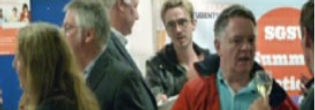
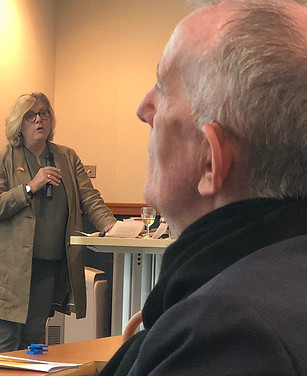
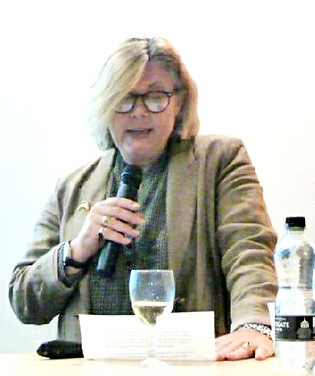
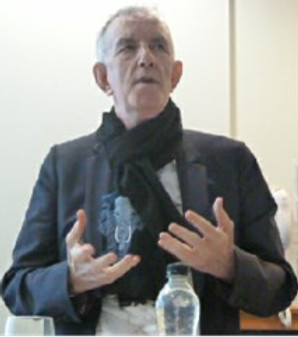

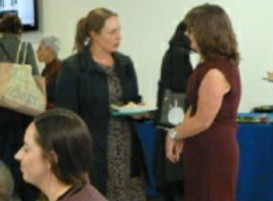
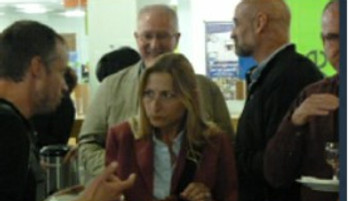
SHORT LISTS 2019
Skellern: Paul French, Mick Mckeown, Oliver Shanley
JPMHN Lifetime Award: Patrick Callaghan, Tony Lieba